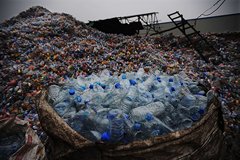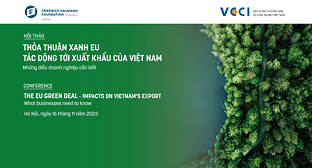UK recycling industry in turmoil over new China import ban
03/01/2018 12:00

Councils across the UK may refuse to recycle plastic following a newly-imposed ban on imported waste by the Chinese government.
The ban, which came into place on 1 January, poses major issues for the UK’s recycling industry.
China announced it would no longer accept 24 grades of plastic, textiles and paper imports it claimed was contaminated with dirty or hazardous materials or other waste products back in July.
This includes “plastics waste from living sources, unsorted waste paper and waste textile materials,” meaning the staples left inside a newspaper or muddied cardboard could be classified as contaminated.
Consequently, UK councils could stop collecting hard-to-recycle plastics like meat trays and yoghurt tops if they are forced to pay higher fees to recycling sorting plants to meet the higher standards, Lee Marshall, chief executive of local authority recycling advisory group Larac, warned last month. From bin to shelf: How the recycling process really works
“While councils don’t like turning materials off… if the economics are such that it does cause them a problem, that’s a decision they’ll have to make,” he told the Guardian.
China’s Ministry of Environmental Protection said the ban was an effort to reduce native pollution and the nation’s health.
“We found that large amounts of dirty wastes or even hazardous wastes are mixed in the solid waste that can be used as raw materials. This polluted the environment seriously,” it said in a note to the World Trade Organisation (WTO).
“To protect China’s environmental interests and people’s health, we urgently adjust the imported solid waste list, and forbid the import of solid wastes that are highly polluted.”
The decision was met with dismay by recycling bodies and waste disposal companies, with the chief executive of the Recycling Association warning rapid implementation of the ban suggests “chaos”.
“Clearly, as much as we in the UK, US and elsewhere do not have enough time to adapt, this is also the case with the Chinese agencies at the other end,” Simon Ellin said. “This suggests there could be chaos until everyone is able to adapt or ideally a much longer time period is given for us to prepare.”
England is using 85 percent fewer plastic bags China has long been the world’s largest importer of recycled materials. Britain imports around 500,000 tonnes of plastic and 3m tonnes of cardboard to the country each year, raising serious questions about how it will be disposed of in the future.
The most likely scenario is that waste will be landfilled, incinerated or stockpiled in the UK.
Environment Secretary Michael Gove admitted he had “not given sufficient thought” to the issue when questioned by the Environmental Audit Committee in November. “I don’t know what impact it will have”, he said. “It’s a very good question and something to which, I will be completely honest, I have not given sufficient thought.”
The WTO held talks with China last month, which failed to clarify which waste materials it was prepared to accept and the delineations of the new quality standards.
The ban, which came into place on 1 January, poses major issues for the UK’s recycling industry.
China announced it would no longer accept 24 grades of plastic, textiles and paper imports it claimed was contaminated with dirty or hazardous materials or other waste products back in July.
This includes “plastics waste from living sources, unsorted waste paper and waste textile materials,” meaning the staples left inside a newspaper or muddied cardboard could be classified as contaminated.
Consequently, UK councils could stop collecting hard-to-recycle plastics like meat trays and yoghurt tops if they are forced to pay higher fees to recycling sorting plants to meet the higher standards, Lee Marshall, chief executive of local authority recycling advisory group Larac, warned last month. From bin to shelf: How the recycling process really works
“While councils don’t like turning materials off… if the economics are such that it does cause them a problem, that’s a decision they’ll have to make,” he told the Guardian.
China’s Ministry of Environmental Protection said the ban was an effort to reduce native pollution and the nation’s health.
“We found that large amounts of dirty wastes or even hazardous wastes are mixed in the solid waste that can be used as raw materials. This polluted the environment seriously,” it said in a note to the World Trade Organisation (WTO).
“To protect China’s environmental interests and people’s health, we urgently adjust the imported solid waste list, and forbid the import of solid wastes that are highly polluted.”
The decision was met with dismay by recycling bodies and waste disposal companies, with the chief executive of the Recycling Association warning rapid implementation of the ban suggests “chaos”.
“Clearly, as much as we in the UK, US and elsewhere do not have enough time to adapt, this is also the case with the Chinese agencies at the other end,” Simon Ellin said. “This suggests there could be chaos until everyone is able to adapt or ideally a much longer time period is given for us to prepare.”
England is using 85 percent fewer plastic bags China has long been the world’s largest importer of recycled materials. Britain imports around 500,000 tonnes of plastic and 3m tonnes of cardboard to the country each year, raising serious questions about how it will be disposed of in the future.
The most likely scenario is that waste will be landfilled, incinerated or stockpiled in the UK.
Environment Secretary Michael Gove admitted he had “not given sufficient thought” to the issue when questioned by the Environmental Audit Committee in November. “I don’t know what impact it will have”, he said. “It’s a very good question and something to which, I will be completely honest, I have not given sufficient thought.”
The WTO held talks with China last month, which failed to clarify which waste materials it was prepared to accept and the delineations of the new quality standards.
Source: Inews
Các tin khác
- More efforts needed to maintain export growth to China: Insiders (24/04/2024)
- Shadow trade minister calls for greater focus on removal of Chinese trade barriers (24/04/2024)
- New U.S. Solar Panel Tariff Intensifies Sino-American Green Tech War (24/04/2024)
- It is expected that there are higher orders and revenue in the second quarter from European businesses (24/04/2024)
- U.S. Ceramic Manufacturers Seeking Tariffs Against Indian Import (24/04/2024)
 Home
Home
 About Us
About Us




















